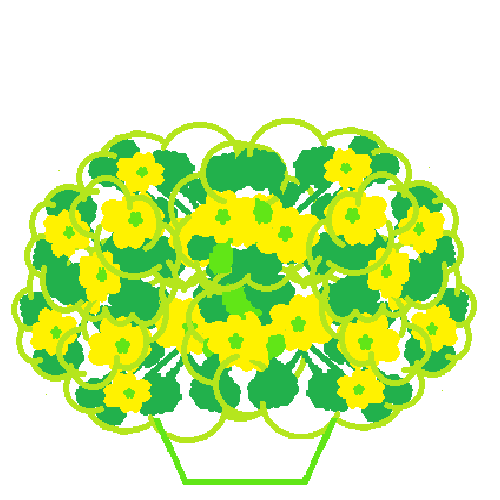For hundreds of thousands of years, people have wandered around large areas of land, finding food as they could, often not even aware there were other people on the planet. They relied on observation and intuition to guide them from place to place, food source to food source. Anyone who could intuitively access information about what they needed was elevated in stature, as were those who could carry large loads or accurately use a spear or stone knife.
As climates changed, people were pushed into smaller and smaller habitable areas and had to find new ways to live. They began to nourish certain "wild" supplies of food and manage forests and range lands, and they learned to rely on a new kind of guidance in the process - one which understood what a plant or tree needed in order to flourish, and how to maintain balance among a group of people living in close proximity.
Early villages grew out of this process. Located along waterways, they were fixed and stable. Houses and gardens were built and animals were brought in to the village rather than hunted in the wilderness. Now decisions had to be made about who would live and work where - and a new kind of guidance was needed to make it work for everyone for the long term. Wise men and women were honored who could access that wisdom and persuade others to follow it. Older women, especially, who had seen life, had learned to read people's hearts, how to nourish plants and babies, and how the climate shifted and changed over the years, were honored and appreciated - as the Neolithic "Venus" figurines attest.
The village gardening life thrived with few hardships and virtually no violence for several thousand years, until a new climate shift caused mass migrations into the river valleys.
Apparently an asteroid hit the planet and caused much desertification. The great plains of northern Africa became the Sahara desert. Much of Central Asia dried up, and areas of the Caucasus became uninhabitable. Many people moved into the river valleys.
Bringing more people into the villages was difficult, but doable, with the existing processes and systems. The land was reapportioned, forests were cut down, reeds planted to replace the fuel, food, and fiber that the trees had provided, and new villages were built where the forests had been.
But along the Tigris and Euphrates and their tributaries, things happened very differently. Large blonde men, riding horses and herding large numbers of cattle, moved down from the Caucasus seeking new pastures. They had little use for gardens and let their herds trample them. In some cases, whole villages were demolished, flattened. These men had no respect for women, seeing them as a bull sees cows, and used them roughly - often stealing them and hiding them so no one could steal them back. And they were rougher, faster, and stronger than most of the valley men they encountered.
By 3200 b.c.e., enough waves of Caucasians had moved into many river valleys that they had changed the culture. From the Indus to the Nile the city-state was now established. Civilization (also known as urbanization) had begun. The foundation for a new kind of culture, based on taking and expanding, was laid.
Under this regime, the land belonged to the emperor-king, who, using the basic idea from the old gardening culture, that the land was sacred to the divine Power, claimed it by divine right: the Divinity (God or Goddess) had given him all the land as long as he could control it. Therefore anyone else could only use it with his permission. If he liked someone or they had done a great service for him, he would give them the right to use the land - either for their lifetime or for some or all succeeding generations.
Up 'til this moment in time, no one had ever thought of "owning" a piece of land. But a mindset that says "I want it and I shall have it" was built into this new kind of leader. Taking over what others are using is normal to that way of thinking - and converting men into herds to trample over other lands (and people) was the way to do that. So armies were born, and the idea of battle.
Taking control of the rich proceeds of new land was the great hunger of this new, Empire culture. From father to son the ambition was passed down: grow! expand! acquire more!
This was the way of Empire culture for over four thousand years: choose a piece of land, take an army there to take it over, and then take as much of the proceeds as possible home, handing out rights to use the land to a few, select individuals. Even through the 1500s and into the 1600s European empires continued to grow by treating the whole world this way. Chinese, Russian, and Islamic empires fought back and forth across Asia, as well.
But then, something new began. The emperors were actually losing wealth by fighting these battles. More and more, the proceeds from the lands were barely enough to cover the cost of acquiring them. Large armies needed supplies. Navies needed to be built and maintained. And even with all the gold and riches of Africa and the Americas, the emperors were falling behind.
This was when the idea of selling land came into the picture. First, emperors sold the right to occupy land to individuals for a period of time: a “leasehold” for a period of years. Soon, in desperation, they actually sold their rights to own and occupy certain pieces of land to individuals. Land grants became a sort of payment for services – especially land in far-away places like the Americas - during those years.
The next step was to grant (or sell) lands to companies. And it was this that made it possible for many to settle North America. The Puritans, for example, contracted with a company to get them to North America based on a promise that they would send back part of their produce in return for the right to live on that land.
Sadly it became clear that people who haven't grown up sharing things in common don't know how to maintain commons or use only their share. The American colonists were not rural villagers with such a history, so they found another way: buy the company's interest in the land and then sell it to the individual residents for their own use.
And so it was that the American Way was established: gather (earn, borrow, inherit, or steal) enough funds to buy enough land for your own home and garden and live the good life for evermore. No divine Power to seek guidance from, no other person;s needs to be bothered by, just me and "my land" to do with as I wish.
So, "how can we buy or sell the Earth?" We do it by ignoring what Chief Seattle pointed out, that what we are buying is part of an interconnected web that we all share in common. We do it by convincing ourselves that, even though we pay the city and county a fee for the right to occupy the piece of land we have title to, and even though we may have one or two mortgages on it that say the lender gets that title as soon as we miss a few payments, and even though someone else owns the rights to any minerals (or in some places, water) that are buried under the surface, somehow we, like the emperors of old, "own" this piece of earth and are entitled to all the produce thereof.
I wonder how long we can maintain that fiction?

 RSS Feed
RSS Feed
